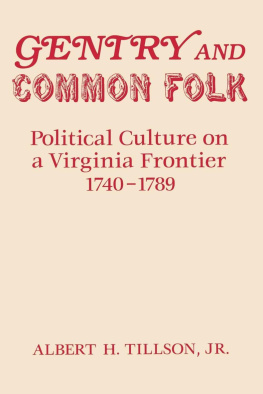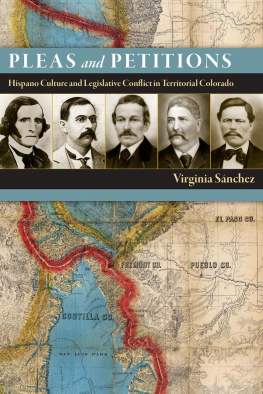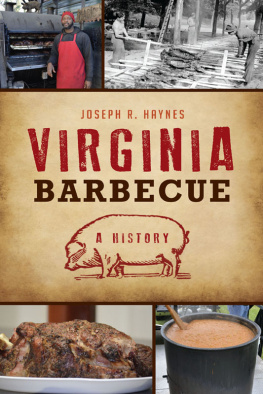GENTRY AND COMMON FOLK
GENTRY AND COMMON FOLK
Political Culture
on a Virginia Frontier
17401789
ALBERT H. TILLSON, JR.
Copyright 1991 by The University Press of Kentucky
Scholarly publisher for the Commonwealth,
serving Bellarmine College, Berea College, Centre
College of Kentucky, Eastern Kentucky University,
The Filson Club, Georgetown College, Kentucky
Historical Society, Kentucky State University,
Morehead State University, Murray State University,
Northern Kentucky University, Transylvania University,
University of Kentucky, University of Louisville,
and Western Kentucky University.
Editorial and Sales Offices: Lexington, Kentucky 40508-4008
Library of Congress Cataloging-in-Publication Data
Tillson, Albert H., 1948-
Gentry and common folk : political culture on a Virginia frontier, 17401789 / Albert H. Tillson, Jr.
p. cm.
Includes bibliographical references and index.
ISBN: 978-0-8131-5517-3
1. VirginiaPolitics and governmentColonial period, ca. 16001775 2. Political cultureVirginiaHistory18th century. 3. Social classesVirginiaHistory18th century. 4. VirginiaHistoryRevolution, 17751783Social aspects. 5. United StatesHistoryRevolution, 17751783Social aspects. I. Title.
F229.T581991
973.2dc2091-8181
This book is printed on acid-free paper meeting
the requirements of the American National Standard
for Permanence of Paper for Printed Library Materials.

For Babs and my parents
Contents
Map, Tables, and Figure
MAP
TABLES
FIGURE
Acknowledgments
A large number of people have helped me to complete this book. At the University of Texas, Philip White, Howard Miller, Barnes Lathrop, and Anthony Orum read and commented on earlier drafts. Richard Beeman, Michael Bellesiles, Emory Evans, Warren Hofstra, Turk McCleskey, and Gregory Nobles kindly provided me with preliminary copies of their own work on backcountry topics. The staffs of various archival centers, particularly the Virginia Historical Society, the Virginia State Library, the Library of Congress Manuscript Division, the McCormick Library of Washington and Lee University, and the Mormon Genealogical Center in Tampa, Florida, have been extremely helpful, as have the interlibrary loan offices of the University of Texas, Pan American University, and the University of Tampa. At the University of Tampa, Martin Denoff and Stephen Magriby patiently helped me enter and analyze much of the data in . The Virginia Magazine of History and Biography and the Journal of Southern History have allowed me to use portions of this book which initially appeared in their pages, and these sections have profited tremendously from the attention of the editors and outside referees of those journals. At the University Press of Kentucky the outside readers made many helpful suggestions regarding the style and content of the manuscript. The University of Texas, the Colonial Dames of America, and the University of Tampa Faculty Development Fund helped finance my research. My parents have encouraged and supported me on countless occasions. Finally, although my wife, Babs Uzenoff, works in the world of modern epidemiology, she has graciously shared in and enriched much of mine.
Introduction
Two issues dominate much of the historiography of eighteenth-century Virginia and carry substantial implications for the emerging scholarship on the southern backcountry. First, historians have differed in analyzing the characteristics and delineating the limits of the deferential political culture that sanctioned the power of Virginias leading men. Second, they have debated the extent to which the American Revolution challenged and altered that deferential culture. This study explores both these issues in the development of the upper, or southern, Valley of Virginia.
Historians of eighteenth-century Virginia have long emphasized the role of deferential and hierarchical values in maintaining that societys political order. According to this interpretation, ordinary Virginians expressed their own humility and acknowledged the superiority of their leaders in a wide variety of political and social interactions. Virginia leaders encouraged respect for their status by conspicuous displays of wealth and by affirmations of their willingness to sacrifice personal well-being for the good of the entire polity. The reciprocal nature of the culture further strengthened its hold on Virginia: ordinary Virginians were expected to defer to the superiority of their leaders, and those leaders in turn frequently acknowledged the particular merits of the simple folk.
In recent years several scholars have suggested that this deferential culture was declining in the prerevolutionary period. Rhys Isaac asserted that the rise of evangelical religion, with its emphasis on austerity and egalitarianism, challenged the conspicuous consumption and hierarchical values that underlay the established order. Dale Benson noted that the expanding activities of Scottish tobacco factors reduced the economic power of the leading planters. In his analysis of Lunenburg County, Richard Beeman suggested that the culture of deference failed to develop in much of the backcountry because regional leaders lacked the wealth and prestige required to overawe their neighbors and compel respect for their status.
Although the Revolution itself has received less attention than the late colonial period, scholars have debated the effect of the war and the succeeding years on the Old Dominion. Jack P. Greene and others have argued that the revolutionary era produced no substantial erosion of popular respect for the elite or the values that sanctioned its authority. Indeed, some scholars have suggested that the revolutionary crisis reinvigorated the gentry and reduced existing frictions within the Virginia population.
Some historians have suggested that the Revolution not only strained but transformed Virginias political culture. According to Rhys Isaac, the Revolution produced a new republican order, based on the contractually limited delegation of power to government by individual citizens. This republicanism, together with the continued growth of evangelical religion, undercut deferential standards, which relied on both an all-encompassing social hierarchy sanctioned by time-honored custom and a widespread use of conspicuous consumption to demonstrate status. In Chesapeake Politics, 1781-1800, Norman K. Risjord asserted that the economic strains of the war and postwar years combined with existing sectional antagonisms to produce the beginnings of issue-oriented partisan politics in Virginia, Maryland, and North Carolina.
Both the controversy surrounding deferential culture and the debate over the nature of the Revolution have influenced recent scholarship on the southern backcountry, the frontier area stretching southward across the western portions of Pennsylvania, Maryland, Virginia, the Carolinas, and Georgia. Richard Beeman and others have suggested that the strength or weakness of ties between local backcountry leaders and provincial authorities explains much of the variation in the social and political order in different portions of the region.
This book addresses these issues in Virginia and backcountry historiography. The chapters on the colonial period assert that although regional leaders did espouse the deferential culture of eastern Virginia, much of the upper valley population rejected these political attitudes. Their dissent became especially strong in the militia and other defense activities. Moreover, the nature of this rejection indicates the beginnings of an alternative popular political culture based on the economic realities of small-scale agriculture, the preference for less hierarchical, more consensual styles of leadership, and an attachment primarily to local neighborhoods rather than to county, colony, or empire.








